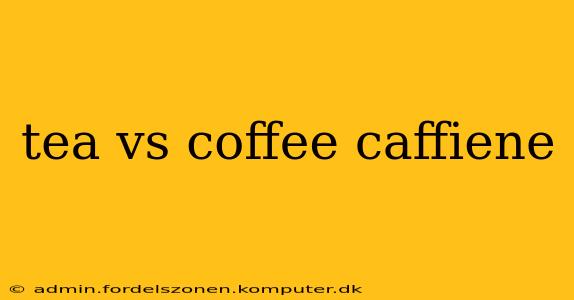The age-old debate: tea versus coffee. Both are beloved beverages enjoyed worldwide, but their caffeine content and effects differ significantly. This comprehensive guide will delve into the caffeine levels of tea and coffee, exploring the nuances that influence the final caffeine kick you experience.
How Much Caffeine is in Tea vs. Coffee?
This is a tricky question without a definitive answer. Caffeine levels vary dramatically depending on several factors:
-
Type of Tea: Black tea generally contains more caffeine than green tea, white tea, or herbal teas (which contain little to no caffeine). Within black tea, different varieties and brewing methods also impact caffeine levels.
-
Type of Coffee: The bean variety (Arabica vs. Robusta), roast level, brewing method (espresso vs. drip), and bean-to-water ratio all affect the caffeine concentration in your cup. Robusta beans, for example, have significantly more caffeine than Arabica beans.
-
Brewing Time: Steeping tea for longer extracts more caffeine. Similarly, over-extracting coffee grounds during brewing will increase caffeine levels.
-
Serving Size: A larger cup of either tea or coffee naturally contains more caffeine.
Generally speaking: A standard 8-ounce cup of brewed coffee contains significantly more caffeine than an 8-ounce cup of brewed tea. However, a strong cup of black tea can still provide a noticeable caffeine boost. Specific caffeine amounts are difficult to pinpoint without specifying the exact variables mentioned above, but a rough comparison is often cited as 95mg of caffeine in an 8-ounce cup of coffee versus 30-50mg for the same amount of black tea.
What are the Effects of Caffeine from Tea and Coffee?
While both tea and coffee deliver caffeine, their effects can subtly differ due to the presence of other compounds. Tea, for instance, contains L-theanine, an amino acid that promotes relaxation and focus. This combination can result in a more balanced and sustained energy boost compared to the often more jittery effect of coffee. Coffee, on the other hand, has a more immediate and intense impact on alertness and energy levels.
Does Tea Have Less Caffeine Than Coffee?
Yes, generally. As previously discussed, a typical cup of brewed coffee contains more caffeine than a cup of brewed tea. However, this is not always the case, and the difference can be subtle depending on the factors listed above. It's crucial to understand that many variables influence the actual amount of caffeine in each beverage.
Is Decaf Tea or Coffee Better for You?
Decaffeinated versions of both tea and coffee are available, significantly reducing the caffeine content. However, it's important to note that decaffeination processes aren't perfect; they don't remove 100% of the caffeine. Choosing decaf can be a beneficial option for those sensitive to caffeine or who want to minimize their intake.
How Much Caffeine is Too Much?
The recommended daily caffeine intake varies depending on individual factors like age, health, and sensitivity. However, exceeding 400mg per day is generally considered excessive and can lead to negative effects like anxiety, insomnia, and digestive issues. It’s always best to listen to your body and moderate your consumption accordingly.
Which is Healthier: Tea or Coffee?
Both tea and coffee offer potential health benefits, containing antioxidants and other bioactive compounds. Tea is often associated with benefits for heart health and immunity, while coffee is linked to reduced risks of certain diseases like type 2 diabetes. Ultimately, the “healthier” choice depends on your individual needs and preferences, and both can be part of a balanced diet. The key is moderation.
This exploration highlights the complexities involved in comparing the caffeine content and effects of tea and coffee. The best beverage for you depends on your personal preferences, caffeine sensitivity, and desired effects. Remember to enjoy both responsibly!
